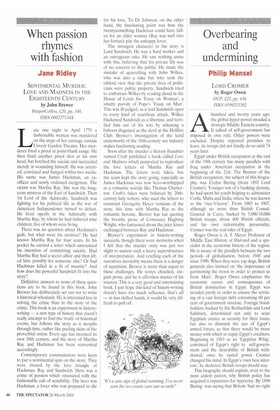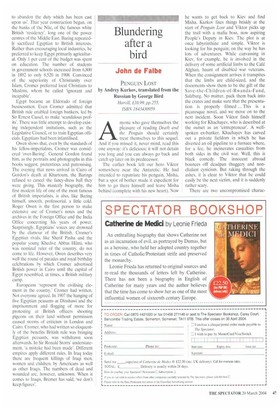Overbearing and undermining
Philip Mansel
LORD CROMER by Roger Owen OUP, £25, pp. 436. ISBN 0199253382 Ahundred and twenty years ago, the global hyper-power invaded a strategic Middle Eastern country. It talked of self-government but imposed its own rule. Other powers were excluded. Despite repeated promises to leave, its troops did not finally do so until 74 years later.
Egypt under British occupation at the end of the 19th century has many parallels with Iraq under American occupation at the beginning of the 21st. The Bremer of the British occupation, the subject of this biography, was Evelyn Baring (from 1892 Lord Cromer). Younger son of a banking dynasty, he had spent his youth helping to administer Corfu, Malta and India, where he was known as the 'vice-Viceroy'. From 1883 to 1907, although no more than British ConsulGeneral in Cairo, backed by 5,000-10,000 British troops, about 400 British officials, and his own indomitable personality, Cromer was the real ruler of Egypt.
Roger Owen is A. J. Meyer Professor of Middle East History at Harvard and a specialist in the economic history of the region. He is aware of the parallels between the two periods of globalisation, before 1945 and since 1990. When they were top dogs, British generals also insisted on 'the importance of garrisoning the moon in order to protect us from Mars'. Roger Owen emphasises the economic causes and consequences of British domination in Egypt. Egypt was invaded partly in order to ensure the servicing of a vast foreign debt consuming 60 per cent of government revenue. Foreign bondholders, backed by the Rothschilds and Lord Salisbury, determined not only to seize Egyptian estates as security for their loans, but also to diminish the size of Egypt's armed forces, so that there would be more money with which to repay Egypt's creditors. Beginning in 1883 as an 'Egyptian Whig', convinced of Egypt's right to self-government and the desirability of British withdrawal, once he tasted power Cromer changed his mind. In Egypt's 'own best interests', he declared, British troops should stay.
This biography should explain, even to the most ardent patriot, why British policy has acquired a reputation for hypocrisy. By 1890 Baring was saying that Britain 'had no right
to abandon the duty which has been cast upon us'. That year construction began, on the banks of the Nile, of the famous white British 'residency', long one of the power centres of the Middle East. Baring repeatedly sacrificed Egyptian to British interests. Rather than encouraging local industries, he preferred to keep Egypt primarily agricultural. Only 1 per cent of the budget was spent on education. The number of students in government schools increased from 6,800 in 1892 to only 8,520 in 1908. Convinced of the superiority of Christianity over Islam. Cromer preferred local Christians to Muslims, whom he called 'ignorant and incapable'.
Egypt became an Eldorado of foreign businessmen. Even Cromer admitted that British rule enabled foreign bankers, led by Sir Ernest Cassel, to make 'scandalous profits'. There was little attempt to develop existing independent insitutions, such as the Legislative Council, or to train Egyptian officials. Egyptians had been infantilised, Owen shows that, even by the standards of his fellow-imperialists, Cromer was considered 'over-Baring'. General Gordon found him, as the portraits and photographs in this books suggest. pretentious and patronising. The evening that news arrived in Cairo of Gordon's death at Khartoum, the Barings refused to cancel the fancy-dress ball they were giving. This masterly biography, the first modern life of one of the most famous of British imperialists, is also, like Baring himself, smooth, professorial, a little cold. Roger Owen is the first person to make extensive use of Cromer's notes and the archives in the Foreign Office and the India Office concerning his years of power. Surprisingly, Egyptians' voices are drowned by the clamour of the British. Cromer's Egyptian rivals, like Sherif Pasha and the popular young Khedive Abbas HiImi, who was nominal ruler of the country, do not come to life. However, Owen describes very well the round of parades and royal birthday celebrations by which Cromer advertised British power in Cairo until the capital of Egypt resembled, at times, a British military camp.
Europeans 'represent the civilising element in the country,' Cromer had written. Not everyone agreed. In 1907 the hanging of five Egyptian peasants at Dinshawi and the imprisonment and flogging of more for protesting at British officers shooting pigeons on their land without permission caused storms of criticism in London and Cairo. Cromer, who had written so eloquently of the benefits British rule was bringing Egyptian peasants, was withdrawn soon afterwards. In Sir Ronald Storrs' understatement. 'a mistake had been made'. Different empires apply different rules. In Iraq today there are frequent killings of Iraqi men, women and children. by Americans as well as other Iraqis. The numbers of dead and wounded are, however, unknown. When it comes to Iraqis, Bremer has said, 'we don't keep figures'.



















































































 Previous page
Previous page